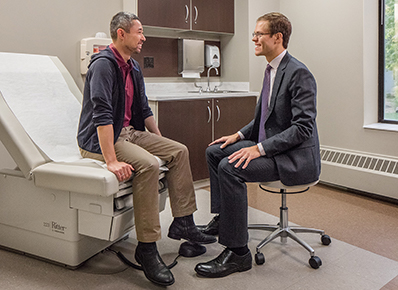Dr. Andrew Johnson Shares His Patient Philosophy and His Role as Comforter to His Patients
As told by Andrew Johnson, M.D.

We sat down with Andrew Johnson, M.D., a neurosurgeon with Endeavor Health Medical Group specializing in brain surgery, to learn more about his practice and patient philosophy.
About the Chicago Brain & Spine Institute

At the
Chicago Brain & Spine Institute, we see all kinds of neurosurgery patients—both
cranial and
spine. I specialize in cranial patients. I primarily see a lot of brain tumors, a little bit of facial pain and any other kind of cranial problem patients at Swedish Hospital may have.
We have a small but very
specialized neuro team, starting from the clinic to the operating room. I believe the patient experience and the patient care is optimized because every team member has a roll and gets patients through in a way that is safe and as pleasant as possible.
My Patient Philosophy
My basic philosophy is to give patients the
least invasive option available to treat their condition. Often, that requires no surgery at all. Spine patients may just need therapy, exercise or pain management. For brain patients, that may be stereotactic radiation—an outpatient painless procedure.
When patients do need
surgery, which is often why they end up in my clinic, I want to take care of their problem effectively first and foremost. If I can, and when possible, I will make the surgery smaller or try to use smaller windows to access the problem so that the recovery is better, but I always want the patient's outcome to be maximized before we worry about anything further.
Comforting Patients
Hearing that you need brain surgery is probably the most terrifying part of any patient's life.
My job has two major parts. One is to provide the safest surgery and the
least invasive option—or least risky option—for the patient's particular problem. The second part, especially with these operations, is to help guide a patient and their family through this hard time.
There are great cases where we can remove a tumor and the patient goes back to life perfectly as usual, but there are other situations with malignant tumors and cancers wherein patients and their families need more support. Helping them through that difficult time is a part of my job that I enjoy, and a part of my job that patients often appreciate more than anything else.
Facial Pain Treatments
Facial pain can sometimes can be related to irritation of one of the cranial nerves, which are the nerves between the brain and the skull. Usually facial pain, or specifically
trigeminal neuralgia, can be managed with medication, but on occasion it will become so severe that a nerve will be so irritated a procedure is necessary.
We do a number of procedures to treat facial pain right here at Swedish Hospital. We can do radiosurgery, which is a way of safely treating the nerve with focal radiation without any incision. We can also do a very small surgery that allows us to go into the front of the brain stem and decompress the nerve.

Andrew Johnson, M.D., is a neurological surgeon with extensive experience in the treatment of cranial and spinal pathology. After earning his medical degree from Columbia University, he completed his neurosurgical traning and endovascular fellowship at Rush University Medical Center. He is trained in endoscopic intracranial surgery, tumor surgery and minimally invasive spine surgery for conditions including brain tumors, meningiomas, trigeminal neuralgia and spinal stenosis.
To schedule an appointment with Dr. Johnson, call
773-271-2225.
By David Modica | Published July 24, 2018

